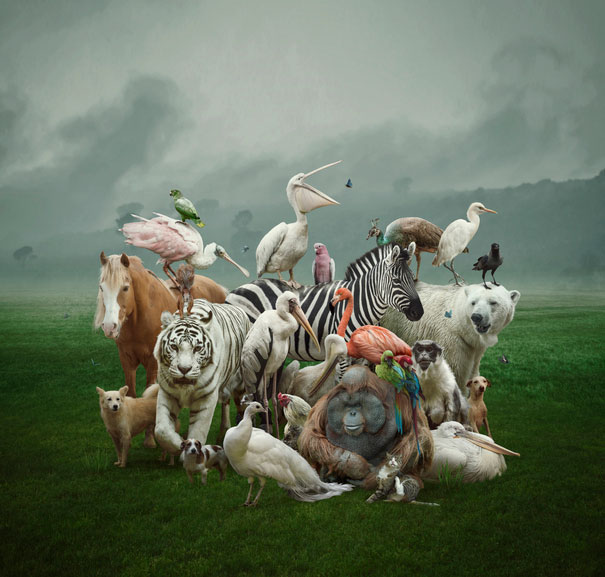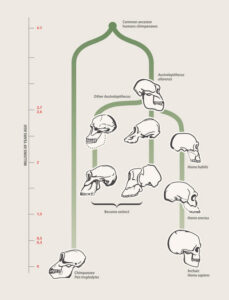

What is Zoology? Zoology is the study of all animal life. It can encompass virtually anything that’s related to animals, including evolution, social patterns, diet, behavior, and much more. Studying zoology in the context of the liberal arts gives you an intersectional understanding of inter-related topics like conservation, environmentalism, naturalistic philosophies and religions, and the longstanding relationship and co-dependence between animals and humans.
The animal kingdom includes insects, fish, birds, amphibians, mammals, and basically anything else that’s not a plant, fungi, or bacteria. Zoology has many sub-branches like:
- Taxonomy – the classification of animals into different clades and species
- Physiology and adaptation – the study of how animals have changed physically over time to adapt to their unique environments
- Biology – including molecular biology, and biochemistry
- Genetics, evolution, and speciation – a look at how the DNA of animals has changed and adapted over time to create different species
- Biodiversity and conservation – a look at natural biodiversity and agricultural monoculture
- Animal behavior – how animals behave around humans, and ethology, which is the study of how animals behave under natural conditions
Philosophical movements like environmentalism and conservationism, and concepts like co-existence with animals, find fertile ground in the context of the liberal arts where the relationship between humans, their environment, and animals can be richly explored.
The Liberal Arts Help Provide Perspectives on Great Ape Zoology and Human Evolution
 The liberal arts provide cultural, religious, scientific, and philosophical answers to the big questions about what it means to be human.
The liberal arts provide cultural, religious, scientific, and philosophical answers to the big questions about what it means to be human.
Zoology provides part of the answer to those question, beginning with taxonomy. Our closest common evolutionary ancestors alive today are chimpanzees and bonobos, and it’s estimated that we all shared a common ancestor as recently as four million years ago.
Zoologists play an important role in gathering evidence about the connections between us and our recent common ancestors. While studying chimpanzees and bonobos they examine things like:
- Social behavior
- Physiological adaptive traits to their environments, such as opposable thumbs and increased cranial volume
- Diet and nutrition
- Use of simple tools such as a twig to fish for termites or rocks to hammer open fruits and use as weapons
Once we know more about chimps and bonobos, we can identify things we have in common. Many humans experience reflex twitch muscle contractions just as we’re falling asleep, known as a hypnic jerk. Some think this is an adaptive trait we’ve inherited over millions of years from the times our distant ancestors lived in trees, a trait that would keep us from falling to the ground as we slept.
What zoologists learn about how chimpanzee brains work is relevant for humans. The complex details of the human brain are still largely a mystery to science. Likewise, philosophical and religious questions that are central to the liberal arts –What is consciousness? Are other animals self-aware? – have yet to be fully fleshed out.
However, studying chimps can help to answer these questions. We can test the intelligence and complex reasoning abilities in chimps and compare them to our own. Physiologically, the human brain has about three times the volume as the chimpanzee brain. Yet even with this size difference chimps have demonstrated the ability for what psychologists call metacognition: the ability to think about thinking; to reflect on and analyze thoughts.
Zoology applied to the study of chimpanzees and bonobos can reveal interesting answers to questions posed by religion and philosophy. It can even shed light on the nature of how we begin dreaming. The liberal arts provide an enriching and relevant context for the study of zoology.

Many of the Great Zoologists Brought a Very Humanistic Perspective to the Study of Animal Life
- Charles Darwin – After observing how animals were specially adapted to their local environments Darwin published On the Origin of Species in 1859, which laid the foundation for how we understand evolution to this day.
- Aristotle – Among many other accomplishments this ancient Greek wrote the History of Animals sometime in the the fourth century BC. A book identifying around 500 different animal species, it’s considered the foundational work of zoology.
- Jane Goodall – One of the most famous modern zoologists known for her lengthy study of chimpanzees.
- Dian Fossey – A colleague of Jane Goodall’s known for her extensive study of gorillas, on which her book Gorillas in the Mist, and subsequent movie, were based.
- Steve Irwin – Irwin was a TV personality and star of the Crocodile Hunter series, which aired in the early 2000’s. He was famous for his youthful exuberance and fearless interactions with dangerous wildlife before being struck in the chest by a stingray and killed instantly in 2000
The Diverse Careers You Will Find in the World of Zoology
As a scientific field that’s devoted to learning everything there is to know about animals, zoology is a broad area that can include many different jobs:
- Conservationists
- Biomedical engineers
- Ecologists
- Wildlife journalists
- Zookeeper
- Wildlife biologists
- Environmentalists
- Museum curators
- Fish and game wardens
- Primatologists
- Veterinarians
- Marine biologists
 The liberal arts provide a global education that augments zoology, adding depth and richness. The study of animals is closely linked with liberal arts subjects like religion, culture, philosophy, science, and even the arts. Throughout human history we’ve depended on animals for our food, tools, folklore, protection, and creative expressions. Cave paintings, the first art ever created by humans, virtually all depict animals.
The liberal arts provide a global education that augments zoology, adding depth and richness. The study of animals is closely linked with liberal arts subjects like religion, culture, philosophy, science, and even the arts. Throughout human history we’ve depended on animals for our food, tools, folklore, protection, and creative expressions. Cave paintings, the first art ever created by humans, virtually all depict animals.
A bachelor’s degree is considered entry-level in the field of zoology. A master’s degree typically opens the door for more advanced investigative and scientific work.
A 2020 report published by the US Bureau of Labor Statistics shows fully 63% of all jobs in the field of zoology are offered through the public sector. State governments employ 40% of the zoologist workforce, with federal employers picking up an additional 23%. Higher education, another sector that places a premium on the liberal arts, accounts for 6% more.






